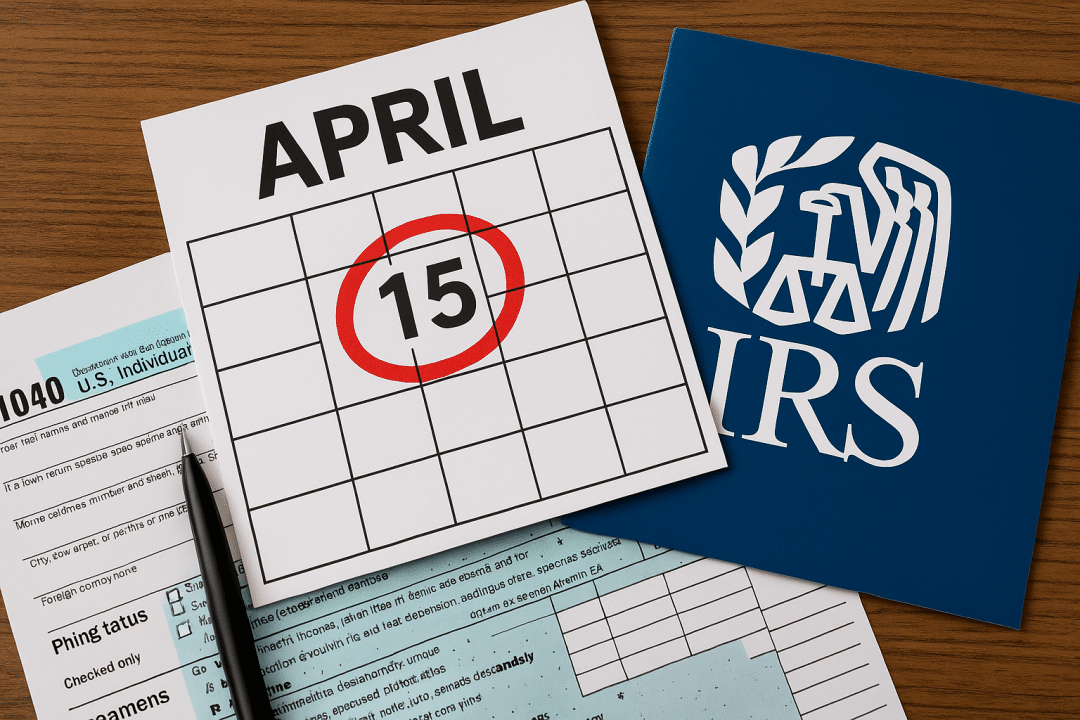The Internal Revenue Service (IRS) is urging last-minute filers to act quickly as the April 15, 2025 tax deadline approaches. From free filing tools to payment plans and disaster-related extensions, here’s what individuals and businesses need to know.

The IRS continues to offer a wide range of free resources for taxpayers filing last-minute returns or seeking help:
- IRS Direct File is a web-based, mobile-friendly tool available to 32 million taxpayers in 25 states. It allows eligible users to file directly with the IRS and includes features to import W-2s, Form 1099-INT, and Form 1095-A.
- IRS Free File is available to everyone to file tax returns or submit an extension to file—even if you don’t meet Direct File criteria.
- The Let Us Help You page on IRS.gov connects users with answers to tax law questions, refund tracking, online accounts, transcripts, and more.
If you’re not ready to file by April 15, request a six-month extension using:
- IRS Free File or tax software
- IRS Direct Pay (check the “extension” box when paying)
- Form 4868, the Application for Automatic Extension of Time To File
Reminder: An extension gives more time to file, but not to pay. You must still pay any owed taxes by April 15 to avoid interest and penalties.
Can’t pay your full tax bill? File anyway and consider these options:
- Short-term payment plan: For balances under $100,000, gives up to 180 days to pay.
- Long-term payment plan: For balances under $50,000. Pay monthly for up to 10 years with automatic withdrawals.
Even if you owe, filing on time avoids the failure-to-file penalty (5% per month). The failure-to-pay penalty is only 0.5% per month while on a payment plan.
The IRS has extended the filing deadline to May 1, 2025 for taxpayers in the following states affected by 2024-25 natural disasters:
- Alabama, Florida, Georgia, North Carolina, South Carolina
- Parts of Tennessee, Virginia, New Mexico, and Alaska
Victims of California wildfires have until October 15, 2025. Kentucky and parts of West Virginia affected by severe weather have until November 3, 2025. Check the IRS disaster relief page for updates.
Free in-person tax prep is available through VITA & TCE for those earning less than $67,000, seniors 60+, and non-English speakers.
Tax documents are also available in Braille, large print, and screen-reader formats through the Alternative Media Center. Special rules apply to active-duty service members, including automatic extensions for those in combat zones.
To avoid filing mistakes:
- Use the Tax Withholding Estimator to prevent surprises next year.
- Monitor your IRS Online Account for key tax documents and payment history.
- Avoid phishing emails or texts impersonating the IRS. Always go to IRS.gov directly.
Tax Day is Tuesday, April 15, 2025. File on time, pay what you can, and explore the IRS tools available to help.
Meanwhile, in Bucks County, post offices will not be staying open late on Tax Day, April 15, 2025. In years past, last-minute tax filers could often count on post offices up until midnight on Tax Day, receiving a hand-stamped postmark that proved they’d beaten the filing deadline. But those days are generally over, as more people file their returns electronically.
According to the IRS, approximately 213 million returns and other forms were filed electronically, representing close to 81.2% of all filings. For individual tax returns, 93.8% were filed electronically.
While some post offices may still extend their hours, that is not the case across Bucks County, according to the postal service's regional communications team. If you file by mail, your return must be postmarked by April 15, meaning it must be filed before the last collection time that day. However, collection hours aren’t always the same as closing hours, which could affect your tax-filing postmark deadline.
For example, your post office could be open until 9 p.m., but last collection could be 7 p.m. Last-minute filers can also double-check with their local post offices to see if they are staying open late. Call USPS directly at 800-ASK-USPS (800-275-8777) for detailed information about post office hours on Tax Day, collection boxes, and mail pick-ups in your area.
For many tax filers, state and federal income taxes are due Tuesday, April 15, 2025. If you are filing an extension, be aware that taxes are due on the original tax deadline.
Levi Anderson, a financial planning manager with the San Diego office EP Wealth Advisors, shared insights for anyone still working on their taxes. If you’re filing an extension, remember that the tax balance must still be paid by Tuesday’s tax deadline, April 15, 2025. “Although the penalty for ‘Failure-to-Pay’ is less than the ‘Failure-to-File’ penalty, the penalty and interest can add up if you wait until later to pay your taxes owed,” he said.
Anderson also noted that it’s not too late to contribute to your 2024 retirement accounts. Making a last-minute contribution to these accounts can reduce your taxable income. “Just be sure you note it as a 2024 contribution when you make it,” he advised.
For last-minute filers looking for free filing resources, qualified taxpayers can still use IRS Direct File and IRS Free File. “Additionally, anyone can use IRS Free File to submit an extension of time to file regardless of their income,” the agency states on its website.
The IRS recommends using electronic filing over paper filing to boost accuracy. “Electronic filing decreases mathematical errors and prompts taxpayers for missing information,” the agency says. “Opting for electronic filing and selecting direct deposit is the fastest and safest way to receive a refund.”
Now is a great time to start getting in shape for next year’s filing season, according to Anderson. “While reviewing your tax return, ask your preparer if they would recommend you consider doing something different in order to be in a better tax position next year,” he suggested. “Most of the tax-savvy moves need to be done by December 31.”






